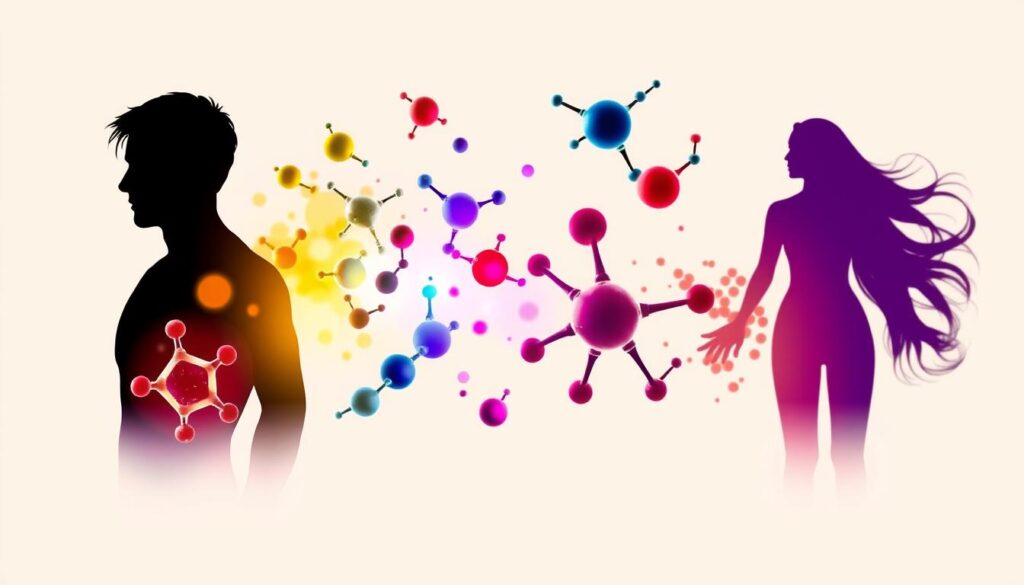Many people wonder if men’s libido is always stronger than women’s. Looking into this question means we have to consider many viewpoints. This includes scientific studies, psychology, and how society affects us.
By looking at libido from different angles, we can better understand the differences. This article aims to make these complex issues clearer.
This topic is more than just interesting. It shapes how we see men and women’s sexual behavior. Let’s explore what science, history, and today’s knowledge say about these differences.
Understanding Libido: A Basic Overview
Libido is a key part of human sexuality, often called sex drive. It has both psychological and biological sides. Knowing its basic meaning and how hormones work is key.
Definition of Libido
The term libido, often linked to sexual desire definition, is about a person’s sexual drive. It’s shaped by many things, like biology, psychology, and society. Sigmund Freud first talked about libido, seeing it as a force behind sexual actions.
Today, we still see libido as a measure of how much someone feels attracted to sex.
The Role of Hormones in Sexual Desire
Hormones have a big effect on libido. Testosterone, estrogen, and progesterone are key hormones for sex drive. Testosterone, found in both men and women, boosts libido.
Estrogen and progesterone, mainly in women, change with the menstrual cycle. This affects their sex drive.

Knowing how hormones work helps us understand why sex drive changes. It shows the complex mix of biology and sexuality.
Biological Differences Between Male and Female Libido
Exploring the biological differences in libido between men and women requires looking at hormones like testosterone and estrogen. Society often simplifies things, but the truth is more complex. Hormonal interactions play a big role in sexual desire in both men and women.
Testosterone and Its Effect on Libido
Testosterone in men is linked to higher libido. This hormone boosts sexual desire and health. Men usually have more testosterone, which can mean they have more sex drive. But, hormonal differences make sexual desire more complex in both men and women.
Estrogen and Progesterone’s Influence
Estrogen and progesterone in women greatly affect their libido. These hormones control sexual desire, menstrual cycles, and reproductive health. Estrogen is key, especially when its levels change, affecting libido at different times in a woman’s life.
Research shows that men don’t always have higher sex drives. Understanding how hormones affect libido can help us see the real differences between men and women.

Is Male Libido Higher Than Female? Science Explains
The debate on libido differences between men and women has been ongoing. To understand these differences, we look at many studies on sexual desire. These studies dive deep into what makes sexual desire vary between genders.

Scientific Studies and Findings
Many studies have explored libido in men and women. They aim to uncover the reasons behind these differences. It’s clear that both physical and mental factors play a big role in libido.
Understanding libido differences is complex. It involves looking at many influences. This approach helps us see the whole picture.
Measuring Libido: Surveys and Self-Reports
Measuring libido is tricky. Researchers often use surveys and self-reports to gather data. These methods need to be accurate and true to people’s experiences.
Despite some challenges, these tools are crucial. They give us a peek into human sexuality. By studying these surveys, we can learn more about sexual desire differences.
Psychological Factors Affecting Libido
Understanding libido psychological factors can greatly improve sexual health awareness. Mental health and libido are closely linked, with many factors affecting sexual desire.
Stress and Mental Health
The impact of stress on sex drive is significant. Stress can lower libido by altering hormones and mental state. Chronic stress can make it hard to feel sexual arousal or interest.
Research shows that therapy can greatly boost libido. Mental health and libido are closely tied. It’s key to tackle psychological issues to improve sex drive.
Self-esteem and Body Image
Self-esteem and body image also play a big role in libido. Feeling good about oneself can boost sexual desire. On the other hand, low self-esteem and poor body image can cause anxiety and reduce libido.
Improving self-image through therapy, self-care, or supportive relationships is crucial. Talking openly with partners about insecurities can also increase intimacy and libido.
For more on libido and psychological factors, check out this study. It shows the importance of mental well-being in sexual health.
Social and Cultural Influences on Libido
Libido is more than just biology; it’s shaped by society and culture too. These factors deeply impact our sexual desires and what we expect from ourselves and others.
Expectations and Stereotypes
Cultural norms and stereotypes shape our sexual expectations. Men are often seen as always ready for sex, while women are viewed as less interested. These ideas can make people feel pressured to fit into these roles.
This can cause a gap between what we feel and what society expects. It’s a big challenge for many.
Impact of Media and Society
The media’s take on libido is very influential. Movies, TV, and ads show unrealistic sexual behaviors. This can make us think our libido is wrong if it doesn’t match what we see.
Social media also plays a big role. Celebrities and influencers share their lives, changing how we see sex. This mix of old and new ideas makes our views on sex complex and ever-changing.
Age and Its Impact on Sexual Desire
Aging changes our bodies in many ways, including our libido. It’s important to understand how these changes affect both men and women. This can help clear up myths about sexual desire as we age.
Libido Changes in Men Over Time
As men get older, their testosterone levels drop. This hormone is key for sexual desire. So, men’s libido often changes with age due to hormones, mind, and body factors. Staying healthy and getting regular check-ups can help manage these changes.
Libido Changes in Women Over Time
Women also see big changes in their libido as they age, especially during menopause. The drop in estrogen and progesterone affects their libido. Aging can make us more aware of our health, which can impact our sex life. Learning to adapt to these changes can make sex more fulfilling.
Both men and women should know that aging and libido are natural. Understanding these changes can help us have a healthier view of sex as we get older.
Do Males Have a Higher Libido Than Females?
For centuries, scholars have wondered if men have a higher libido than women. The debate spans from ancient times to today’s science. It’s a complex issue with many viewpoints.
Historical Perspectives
In the past, cultures saw men’s libido as endless and women’s as limited. Ancient texts showed men as always ready for sex, while women were seen as less interested. These views were shaped by society’s rules for men and women.
Yet, some old cultures believed women had strong desires too. But, society’s rules often kept these desires hidden. These old ideas still shape how we see sex today.
Current Understanding
Today, we know libido is more complex. It’s influenced by biology, psychology, and society. For example, hormones like testosterone affect both men and women’s desire for sex.
Also, mental health, stress, and relationships play big roles in libido. Studies, like this one, show how important it is to talk and understand each other’s needs.
By understanding both old and new views on libido, we can see how diverse sexual desire is. This knowledge helps couples deal with their unique challenges. It strengthens their bond emotionally and physically.
Do Women Have Lower Libido Than Males?
Looking into the idea that women have less sexual desire than men is key. We need to check out the latest studies and what experts say. Today, we know that women’s sexual desire is more complex than old myths suggest.
It’s crucial to understand that many things affect sexual desire in both men and women. Experts say that things like environment, mind, and body all matter. By debunking old myths, we can have a better talk about sexual desire.
Research shows that women’s sexual desire isn’t always lower than men’s. It changes because of many things like hormones, stress, and relationships. This shows we need to look at each person’s situation, not just make general statements.
“The idea that women naturally have less libido than men is something science is challenging,” says Dr. Chloe Carmichael, a clinical psychologist.
Research and changing views are helping to clear up the myth that women have less libido. This change helps us understand women’s sexual desire better. It also leads to more open and informed talks about sex and desire for everyone.
How Relationship Dynamics Affect Libido
Understanding how relationship dynamics affect libido is key to a healthy connection. Many factors in a relationship impact sexual desire between partners.
Emotional Intimacy
Emotional intimacy is crucial for a strong romantic bond. It’s vital for sexual desire to grow. A study shows women’s sexual desire is linked to emotional states. This shows how important emotional connection is.
Communication and Compatibility
Good communication is essential for a healthy libido. Talking about needs and boundaries is important. It helps partners understand each other better.
Being compatible in all areas, including sex, boosts mutual desire. This ensures both partners are happy and fulfilled.
By focusing on these relationship factors on libido, couples can improve their sexual health. They can keep their relationship intimate and satisfying.
The Impact of Health and Lifestyle on Libido
Understanding how health and lifestyle choices affect libido can provide valuable insights into maintaining a healthy sex life. Various factors such as diet, exercise, substance use, and medications play significant roles in shaping sexual desire.
Diet and Exercise
Maintaining a balanced diet and a regular exercise routine can greatly influence one’s sexual desire. Foods rich in vitamins and minerals, such as leafy greens and fruits, contribute positively to overall well-being and may enhance sex drive. Additionally, regular physical activity boosts blood flow and endorphin levels, which are crucial for maintaining a healthy libido.
In contrast, poor dietary habits can lead to fatigue and reduced libido. Incorporating a variety of nutrient-dense foods into your diet and staying physically active are key strategies for improving diet and sex drive.
Substance Use and Medications
Substance use, including alcohol and drugs, can have a significant impact on sexual desire. While moderate alcohol consumption might temporarily lower inhibitions, excessive drinking can impair sexual performance and reduce libido over time.
Moreover, certain medications prescribed for health conditions can also have detrimental effects on libido. For example, antidepressants and blood pressure medications are known to influence sexual desire adversely. Being aware of these medication impacts on libido and consulting healthcare professionals for alternatives can be beneficial for maintaining a healthy sex life.
Overall, making informed lifestyle choices can positively affect libido, underscoring the importance of a well-rounded approach to health and well-being.
Common Myths About Male and Female Libido
Many think men always want sex more than women. This idea simplifies the complex world of sexual desire. Both men and women see changes in their sex drive due to stress, health, and relationships.
It’s also believed that wanting sex a lot means a healthy relationship. But this overlooks the importance of emotional connection. A good relationship is about understanding and connection, not just sex.
Some believe hormones make men more sexual than women. Hormones do play a role, but they’re not the whole story. Psychological and social factors also shape our libido.
Lastly, debunking myths means knowing libido can change. It’s different for everyone, so we need to be open-minded.
By exposing these myths, we can have a more honest talk about libido. We can move past old stereotypes.
Therapeutic Approaches to Balancing Libido
Fixing libido issues can really improve life for people and couples. There are many ways to boost and balance sexual desire.
Counseling and Therapy
Talking to a sexual desire counselor can change lives. Skilled therapists create a safe place to look at what affects libido. This therapy helps couples and individuals overcome emotional and psychological hurdles, leading to better understanding and improvement.
- Individual Therapy: Helps find personal blocks to sexual desire.
- Couples Therapy: Works on relationship issues and talking about sexual needs.
Medications and Supplements
Libido-enhancing medications have gotten better over time, offering real solutions. It’s important to talk to a doctor about the good and bad sides. There are many choices out there.
- Prescription Medications: Made to fix specific hormonal problems or conditions.
- Supplements: Natural stuff like ginseng and maca might help boost libido.
Can Libido Be Naturally Boosted?
Are you wondering if you can naturally boost your libido? The answer is yes. You can do it by adopting healthy habits and practicing mindfulness. Let’s look at how a healthy lifestyle and mindfulness can boost your sex drive.
Healthy Habits
Healthy habits are key to boosting your libido naturally. Eating a balanced diet full of vitamins and minerals is important. It helps keep your body and mind healthy, which supports your sex life.
Regular exercise is also vital. It improves your physical health and boosts your mood. These are important for a healthy sex life.
Key Healthy Habits Include:
- Eating a nutritious diet
- Regular physical activity
- Ensuring adequate sleep
- Staying hydrated
Mindfulness and Stress Reduction
Mindfulness and stress reduction are crucial for your sex drive. Stress can kill your libido, but managing it can improve your sexual desire. Mindfulness practices like meditation, yoga, and deep breathing help reduce stress.
“Mindfulness practices like meditation are instrumental in reducing stress and enhancing sexual well-being.”
Adding these practices to your daily life can help boost your libido naturally. It can make your life more fulfilling and healthy.
The Role of Partner Compatibility in Sexual Desire
It’s important to understand how well partners match in interests and values. This match, known as partner compatibility libido, greatly impacts relationship happiness.
Shared Interests and Values
The shared values impact on libido is huge. When partners share interests and values, it builds a strong emotional bond. This bond can boost sexual desire.
These shared values create a base for deeper intimacy and respect. This often leads to a more satisfying sexual life together.
Sexual Communication
Good sexual desire communication is also key. Talking openly about desires, boundaries, and expectations helps both partners feel valued. This kind of talk builds trust and lowers anxiety.
In short, focusing on shared values and good sexual communication is vital. It strengthens the bond between partners, improving their sexual desire and overall relationship happiness.
Case Studies and Personal Stories
Understanding sexual desire means looking at real-life stories. Libido case studies and personal libido experiences give us deep insights. They show how complex and varied sexual desire can be.
Dr. Laura Berman, a famous sex therapist, shared a story. A couple was facing a big challenge: their sex drive was out of sync. The husband’s desire dropped due to stress, but his wife’s stayed strong. Thanks to therapy and talking openly, they found their way back to each other.
“We’ve had to relearn how to prioritize our time together, and more importantly, how to be honest about our needs without judgment,” shares the husband.
A 35-year-old woman also shared her story. She talked about how her libido changed after having a baby. Her personal libido experiences showed how physical and emotional changes can affect desire. She said talking openly with her partner and getting help made a big difference.
“It was therapeutic to talk openly without feeling embarrassed. Understanding that it’s a normal part of life made it easier for us to adapt,” she explains.
These stories highlight that libido is not fixed. It changes based on many things like stress, health, and hormones. Each person’s journey is unique and teaches us something valuable.
Future Research Directions on Libido Differences
As we explore human sexuality, future studies on sexual desire are key. We need to look into how genes affect libido. This could show how certain genes influence sexual desire in different people and at various ages.
Also, we should study how libido relates to mental health issues like anxiety and depression. This could help us understand how these factors together affect sexual well-being.
Libido science needs a more complete research approach. We should conduct long-term studies to see how sexual desire changes over time. We must consider things like relationships, lifestyle, and cultural influences.
It’s also important to see how new tech, like health trackers and AI, can help. These tools could give us more detailed and personal data on libido. This could change how we understand and measure sexual desire.
Lastly, we must include diverse and inclusive research. This means studying different gender identities and sexual orientations. By doing this, we can gain a deeper understanding of human sexuality.
This approach will make future studies on sexual desire more accurate and relevant. It will help us achieve better health outcomes and gain deeper insights into libido.






